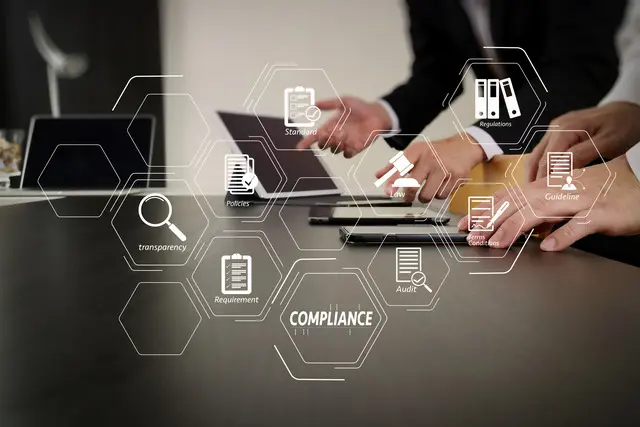Compliance Monitoring Automation: A Lifeline for Supply Chain Resilience
In today’s complex and interconnected supply chains, ensuring compliance with contractual agreements, regulatory requirements, and ethical standards is paramount. Compliance Monitoring Automation emerges as a lifeline for businesses, streamlining this critical process for enhanced efficiency and accuracy.
Challenges of Compliance Monitoring in Supply Chains:
- Manual monitoring is time-consuming, prone to errors, and lacks scalability.
- Siloed data and fragmented systems hinder visibility and make it difficult to track compliance across the supply chain.
- Compliance violations can lead to costly penalties, reputational damage, and supply chain disruptions.
The Power of Python, AI, and Cloud for Compliance Automation:
Compliance Monitoring Automation leverages the power of Python, AI, and cloud-based solutions to:
- Automate checks and validations: Python scripts can be used to automate the monitoring of supplier data, contracts, and compliance documents.
- Generate audit trails and documentation: AI-powered tools can assist in generating detailed audit trails and compliance documentation, providing a comprehensive record of all monitoring activities.
- Resolve compliance issues: Automated workflows can be triggered to escalate compliance issues, initiate corrective actions, and ensure timely resolution.
By embracing Compliance Monitoring Automation, supply chain businesses can enhance their resilience, reduce risks, and gain a competitive edge in today’s demanding market.

Python, AI, and Cloud: The Trifecta for Compliance Monitoring Automation
Python for Unattended and Attended Bots:
Python excels in developing both unattended and attended bots for Compliance Monitoring Automation.
- Unattended bots: Python scripts can run autonomously, 24/7, to monitor compliance data, perform automated checks, and generate audit trails.
- Attended bots: Python-built attended bots assist human users in their compliance tasks, providing real-time guidance, data extraction, and automated documentation.
Cloud Platforms: Beyond RPA/Workflow Tools:
Cloud platforms offer far more capabilities as automation orchestrators compared to traditional RPA/workflow tools. They provide:
- Scalability: Cloud platforms can handle massive volumes of data and complex compliance processes.
- Flexibility: Cloud platforms allow for easy customization and integration with existing systems.
- Cost-effectiveness: Cloud platforms offer pay-as-you-go pricing models, reducing upfront investment costs.
AI for Enhanced Accuracy and Edge Case Handling:
AI techniques like image recognition, natural language processing (NLP), and generative AI (Gen AI) can significantly enhance the accuracy and capabilities of Compliance Monitoring Automation.
- Image recognition: AI can analyze supplier documents, such as contracts and invoices, to extract data and identify potential compliance issues.
- NLP: AI can process unstructured data, such as emails and chat logs, to identify compliance-related risks and trends.
- Gen AI: AI can generate automated responses to compliance inquiries, reducing the burden on human teams.
By leveraging the power of Python, AI, and cloud platforms, businesses can achieve a robust and efficient Compliance Monitoring Automation system, ensuring adherence to regulatory requirements, contractual obligations, and ethical standards.

Building the Compliance Monitoring Automation System with Python and Cloud
Sub-Processes and Automation:
1. Data Extraction and Validation:
- Python scripts can extract data from supplier contracts, invoices, and other documents.
- Cloud-based AI services can analyze extracted data to validate its accuracy and completeness.
2. Compliance Checks:
- Python scripts can compare extracted data against predefined compliance rules and regulations.
- Cloud platforms can provide scalability and performance for handling large volumes of compliance checks.
3. Audit Trail Generation:
- Python scripts can automatically generate detailed audit trails of all compliance checks and actions.
- Cloud storage services can securely store audit trails for compliance purposes.
4. Issue Resolution:
- Python scripts can trigger automated workflows to escalate compliance issues and initiate corrective actions.
- Cloud platforms can facilitate collaboration and communication between different teams involved in issue resolution.
Data Security and Compliance:
Data security and compliance are paramount in Compliance Monitoring Automation. Python and cloud platforms provide robust security features to protect sensitive data and ensure compliance with industry regulations.
Python vs. No-Code RPA/Workflow Tools:
- Python offers greater flexibility, customization, and scalability compared to no-code RPA/workflow tools.
- Python-based automations can handle complex compliance processes and edge cases more effectively.
- No-code tools often have limitations in data handling, integration capabilities, and performance.
Algorythum’s Approach:
Algorythum recognizes the limitations of off-the-shelf automation platforms and takes a Python-based approach to Compliance Monitoring Automation for the following reasons:
- Tailor-made solutions: Python allows us to build custom solutions that meet the unique compliance requirements of each client.
- Enhanced performance: Python-based automations are highly efficient and scalable, ensuring smooth operation even with large data volumes.
- Future-proof investments: Python is a widely adopted language with a vast ecosystem, ensuring the longevity and maintainability of our solutions.

The Future of Compliance Monitoring Automation
The future holds exciting possibilities for Compliance Monitoring Automation. By leveraging emerging technologies, businesses can further enhance their compliance processes:
- Blockchain: Blockchain can provide immutable and transparent records of compliance checks and audit trails.
- Machine learning: Machine learning algorithms can analyze compliance data to identify patterns, predict risks, and automate decision-making.
- Robotic process automation (RPA): RPA bots can automate repetitive tasks, such as data entry and document processing, freeing up human teams to focus on higher-value activities.
Subscribe to Algorythum
Stay ahead of the curve and subscribe to Algorythum for the latest insights on Compliance Monitoring Automation and other industry-specific automation trends.
Contact Us
Contact our team today for a free feasibility assessment and cost estimate for your custom Compliance Monitoring Automation solution. We are committed to helping businesses achieve robust and efficient compliance processes that drive growth and competitive advantage.

Algorythum – Your Partner in Automations and Beyond
At Algorythum, we specialize in crafting custom RPA solutions with Python, specifically tailored to your industry. We break free from the limitations of off-the-shelf tools, offering:
- A team of Automation & DevSecOps Experts: Deeply experienced in building scalable and efficient automation solutions for various businesses in all industries.
- Reduced Automation Maintenance Costs: Our code is clear, maintainable, and minimizes future upkeep expenses (up to 90% reduction compared to platforms).
- Future-Proof Solutions: You own the code, ensuring flexibility and adaptability as your processes and regulations evolve.









